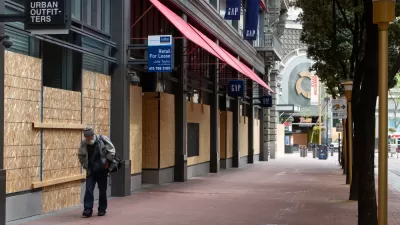David Duyen identifies an under-reported culprit in the so-called "retail apocalypse," and challenges policy makers to respond.

According to David Duyen, the string of bad news about the performance of the retail sector in the United States is at odds with the remainders of the economic picture in the country.
The economy is growing, unemployment is low, and consumer confidence is at a decade-long high. This would typically signal a retail boom, yet the pain rivals the height of the Great Recession. RadioShack, The Limited, Payless, and Toys“R”Us are among 19 retail bankruptcies this year.
Duyen does not accept Amazon and other online realtors as the cause of the "retail apocalypse," however. Instead, Duyen points to debt as the reason for the struggles of traditional retail businesses. Specifically, "[p]rivate equity firms purchased numerous chain retailers over the past decade, loading them up with unsustainable debt payments as part of a disastrous business strategy."
Duyen's argument is built upon detailed analysis recently published by a team of reporters at Bloomberg. That article predicts that the worst is yet to come for retail businesses because billions more in debt is due in the next few years. "Eight million American retail workers could see their careers evaporate, not due to technological disruption but a predatory financial scheme," writes Duyen. "The masters of the universe who devised it, meanwhile, will likely walk away enriched, and policymakers must reckon with how they enabled the carnage."
Duyen notes that policies included in the GOP tax plan making its way through Congress would ostensibly mitigate the situation by removing some of the incentives for private equity to raid companies. However, according to Duyen, the plan also includes a gaping loophole in the form of an exemption for real estate companies.
FULL STORY: The Cause and Consequences of the Retail Apocalypse

Alabama: Trump Terminates Settlements for Black Communities Harmed By Raw Sewage
Trump deemed the landmark civil rights agreement “illegal DEI and environmental justice policy.”

Planetizen Federal Action Tracker
A weekly monitor of how Trump’s orders and actions are impacting planners and planning in America.

The 120 Year Old Tiny Home Villages That Sheltered San Francisco’s Earthquake Refugees
More than a century ago, San Francisco mobilized to house thousands of residents displaced by the 1906 earthquake. Could their strategy offer a model for the present?

In Both Crashes and Crime, Public Transportation is Far Safer than Driving
Contrary to popular assumptions, public transportation has far lower crash and crime rates than automobile travel. For safer communities, improve and encourage transit travel.

Report: Zoning Reforms Should Complement Nashville’s Ambitious Transit Plan
Without reform, restrictive zoning codes will limit the impact of the city’s planned transit expansion and could exclude some of the residents who depend on transit the most.

Judge Orders Release of Frozen IRA, IIJA Funding
The decision is a victory for environmental groups who charged that freezing funds for critical infrastructure and disaster response programs caused “real and irreparable harm” to communities.
Urban Design for Planners 1: Software Tools
This six-course series explores essential urban design concepts using open source software and equips planners with the tools they need to participate fully in the urban design process.
Planning for Universal Design
Learn the tools for implementing Universal Design in planning regulations.
Clanton & Associates, Inc.
Jessamine County Fiscal Court
Institute for Housing and Urban Development Studies (IHS)
City of Grandview
Harvard GSD Executive Education
Toledo-Lucas County Plan Commissions
Salt Lake City
NYU Wagner Graduate School of Public Service





























